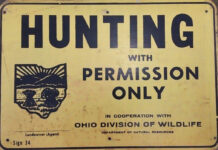“Received the sad intelligence of sister Lydia’s death,”
— Ohio farmer Alexander Smalley, Jan. 31, 1873 diary entry.
On March 1, Alexander Smalley’s sister Kate returned home from Iowa along with Lydia’s widower and children.
“Found Kate had been quite sick. She is not looking very well yet. Brought the three youngest children. It is agreed that we will take Frank, Ben and Katie, as their father must return home to other children,” Smalley writes of this monumental decision for his family.
The next day, “Succeeded in getting a cradle for little Katie.”
We know from a previous entry that Ben would have been only 3 years old. Frank’s age is never determined in the diary entries.
On March 5, “Frank seems to be contented. Our society social tonight would have been good if two miserable ruffians would have stayed away. Newman rowdies Dave and Banton, the lowest dregs of society were there, for no good.”
Life was not always tame. “After getting 80 loads of shocks, I went down to Heichel’s exhibition tonight, Egyptian mummy. Was a grand show. George Gregg hit Sam Dove!”
One has to wonder if nephew Frank had witnessed both the rowdies and the punching at the mummy exhibition, and just what was going through his mind as he tried to adjust to the changes in his young life. His father had returned to Iowa, presumably alone, on March 13.
Jan. 25, “Another Forbes fracas last night. Husband knocked wife down while in a drunken fit. Earlier in the month, “Had a loud time at Society meeting. The debate became heated over the topic, “should foreign emigration be encouraged?”
On the April day of neighbor Glenn’s sale, “Some northern rowdies, 14 or more, were there and acted worse than imps of hell.”
Later that month, “Was witness at a trial of several young ruffians in which old McCarty blew off several drunken speeches. The drum-head jury returned a verdict about 8 p.m. of not guilty. Oh, consistency, thou art a jewel!” he writes with dripping sarcasm.
The single most life-altering entry to date in Smalley’s life is May 9, 1873. “My dear mother was stricken with palsy about 7 a.m. and quietly breathed her last between 8 and 9. Our neighbors have manifested a marked degree of kindness.”
His mother’s death came just two months after taking on three young grandchildren to raise. And though Frank and Ben are mentioned many times in the upcoming years, baby Katie is not. Perhaps the baby was taken in by her paternal grandparents, the Helmans.
The next day, a Saturday, “The saddest day, we hope, of the year. Mother’s funeral took place at 2 p.m., friends assembling at an early hour. Was a very large attendance considering the short notice,” Smalley writes.
I spent a considerable time searching in the nearby, remotely placed Eckley Cemetery to determine Alexander’s mother, Mary Smith Smalley, age 56, is buried there, the soapstone monument growing difficult to read.
She was laid to rest close to three of her children’s graves, an unnamed infant, a son, John Cyrus who died at the age of 4 in 1846 which was the year Alexander was born, and daughter Sarah who had died in 1863, age 23.
Alexander’s sorrow is heavy as he writes, “Arose this morning as usual and sad, oh sad, indeed to see a vacant chair in our little family circle.”
A few days later, after plowing with three horses in a big day’s work, he writes, “It appears very lonely at home now. What is a home without a mother?”














I am absolutely adopting “imps of Hell” for modern day use.